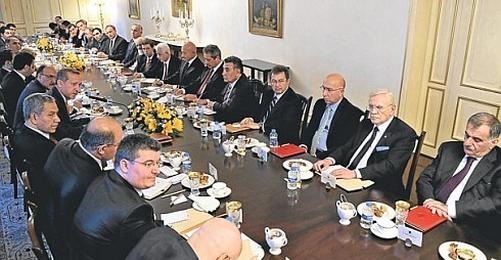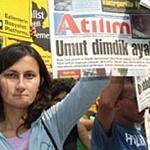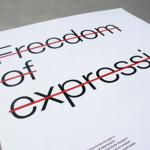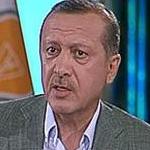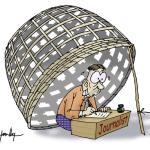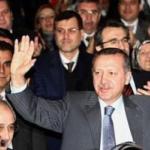After the Prime Minister Recep Tayyip Erdoğan held a meeting with owners and executives of media organizations on Friday (21 October), the Anadolu Agency (AA), the Turkish News Agency (AHT), the Ankara News Agency (ANKA), the Cihan News Agency (CİHAN) and the İhlas News Agency (İHA) announced in a joint statement that they were going to "comply with the publication bans of the competent authorities".
The agencies are the source of news for newspapers and television channels. Their statement gave reason to concern whether the news were going to be "controlled right from the start".
"Social benefit and solidarity"
The declaration on how to make news on issues of "terrorism and violence incidents" remained vague. It was said that for this sort of news "the public order will be taken into account", "a distance will be kept to approaches that give reason to fear, chaos, hostility, panic and intimidation", "publication bans of the competent authorities will be complied with", "no publication shall include propaganda for an illegal organization" or "news and visuals will reach the subscriber by considering the social benefit and solidarity".
On the web site of AA it was announced that "joint publication principles regarding terrorism incidents were defined". No information was given on the aim and the time frame of the declaration.
It had recently been a subject to discussion how many soldiers actually died in the attacks of the militant Kurdistan Workers' Party (PKK) in Çukurca and Yüksekova (Hakkari) on 19 October. The Turkish Armed Forces (TSK) announced 24 casualties whereas the PKK claimed the death of 81 soldiers. The new declaration came after the news agencies had published these contradicting numbers. Critics asked if "another obstacle before obtaining correct information" was going to come.
"Single type of media and national journalism"
Several journalists criticized the closed meeting of Prime Minister Erdoğan with owners and general publication directors of media organizations. Critics said that the non-disclosure of the topics discussed at the meeting was one way to establish pressure that might lead to censorship. Hence, the people's right to information had been restricted, the critics emphasized. "The talks of some newspaper executives expressing themselves as if they were waiting for a directive" was a focal point of criticism.
Yasemin Çongar from Taraf newspaper attended the meeting. In her article entitled "National Journalism and my 'non-national' feelings" she wrote, "Prime Minister Erdoğan thanked for the "full participation".
Çongar continued, "Did any new, constructive, creative idea emerge from the discussion what the media can do on the way to stop the bloodshed and use a language of peace in the name of peace? No."
"The Prime Minister recommended to 'pay attention to the line between the people's right to information and the journalists' duty to inform on one hand and allowing for PKK propaganda on the other hand'. Rather than that I was surprised about the willingness of the journalists regarding censorship by the nation. It was truly breathtaking that more proposals to 'standardize' the media came from the media than from the government".
Çongar did not write what she actually said at the meeting. However, in her article the journalist revealed that Prime Minister Erdoğan "proposed a single-type media".
"A shame for democracy"
Orhan Birgit, President of the Press Council, criticized the meeting from a different point of view:
"We are sad about the alienation the Prime Minister created between journalists. The opinions of representatives of the Press Council, of the Freedom for Journalists Platform joined by the TGS [Journalists Union of Turkey], the TGC [Journalists' Society of Turkey], and Journalists Associations of Ankara, Izmir and Anatolia and of all media organizations have not been considered. This is a significant drawback in an attitude-making meeting. The Prime Minister applied accreditation procedures to national television channels and press institutions. We regret this was the case in such a vital issue".
Tekirdağ Deputy Candan Yüceer of the opposition Republican People's Party (CHP) submitted a parliamentary question to PM Erdoğan asking "why executives of Cumhuriyet, Sözcü and Aydınlık newspapers had not been invited to the meeting.
The Journalists' Association of Turkey (TGC) commented the meeting as follows:
"We see a huge mistake in the meeting Prime Minister Erdoğan held with owners and executives of media outlets on the topic on terrorism. It is a failure not to invite certain newspapers and television channels to such a meeting that concerns the whole nation, especially Cumhuriyet newspaper but also Sözcü, Yeniçağ, Aydınlık, BirGün and Evrensel newspapers. This is a shame for democracy".
"The Prime Minister mentions transparency at every occasion. Hence it is our right to expect his respect for the people's right to information. Recreating the image of a newly risen accreditation problem is another adversity in itself. We would like to remind once more that democracy is a regime of tolerance", the TGC declared.
Participants
The meeting was attended by Aydın Doğan, representative of the Doğan Media Group; Mehmet Emin Karamehmet, owner of Akşam newspaper and Show TV; Turgay Ciner, owner of HaberTürk; Ahmet Çalık, owner of Sabah newspaper; Ferit Şahenk, owner of NTV; Ali Bulut, owner of Zaman newspaper; Mücahit Ören from the Turkey newspaper; Mustafa Karahasanoğlu, CEO of Yeni Akıt newspaper; the daily's General Publications Co-ordinator Hasan Karakaya, representatives of the Sabah and ATV Group, Milli newspaper, Yeni Şafak, Star TV, TV 24 and TV8; HaberTürk publications director Fatih Altaylı; Eyüp Can Sağlık from Radikal; Mustafa Karaalioğlu from Star; Enis Berberoğlu from Hürriyet; Ergun Babahan from Star; Mehmet Ali Birand from CNNTürk; İsmail Küçükkaya from Akşam; Yiğit Bulut from HabertürkTV; and Yasemin Çongar from Taraf. (AS)





